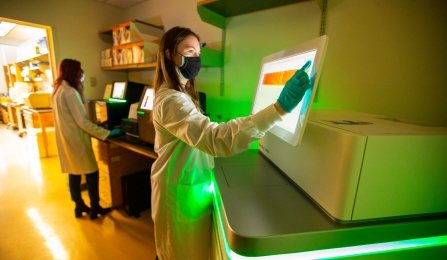
Data-Driven Healthcare Opportunities
Explore interdisciplinary master's programs combining biology, computer science, statistics, and mathematics to analyze and interpret biological data. Our data-driven biomedical programs focus on the development and application of computational tools and techniques to process, store, and analyze large datasets generated by experimental methods, such as genomics, proteomics, and metabolomics. Ready to take the next step? Our Biomedical Informatics or Genetics, Genomics, and Bioinformatics programs are for you!
Sign up for our Mailing List to learn more about our programs and stay connected with what's going on at the Jacobs School!

Biomedical Informatics, MS
Our program blends the health sciences with the computational sciences, enabling you to solve complex biological and healthcare system challenges. You'll develop the technical and leadership skills needed to impact the future of patient care, whether at the bedside, in the C-suite, or in the lab. You'll be prepared for careers in healthcare, industry, biomedical research, and academics.
Learn from five areas that define our program: bioinformatics and translational research informatics, clinical Informatics and decision support, population and public health Informatics, biomedical ontology, and sociotechnical and human-centered design.
Genetics, Genomics, & Bioinformatics, MS
Our interdisciplinary program offers you broad exposure to genetics, genomics, and bioinformatics through courses in bioinformatics and genomics, with hands-on research in leading biomedical research laboratories.
You’ll focus on the development and application of computational tools and methods for analyzing and interpreting biological data, including analyzing large datasets such as genomic, transcriptomic, epigenomic, proteomic, and metagenomic datasets.
Top Reasons to Consider a Data-Driven Healthcare Program

It's a growing field. With the increasing amount of biological and medical data being generated every day, there is a growing demand for professionals who can analyze and make sense of this data. These programs are at the forefront of this data analysis, and there are many job opportunities available for graduates with expertise in these areas.

Interdisciplinary nature. These programs draw on knowledge from biology, computer science, mathematics, statistics, and engineering. This can make for a stimulating and intellectually challenging learning experience, as you'll be exposed to a wide range of different disciplines and learn how to integrate them to solve complex problems.

Make an Impact. You can have a direct impact on human health and well-being. For example, you might develop algorithms to identify potential drug targets, design personalized treatment plans for patients based on their genomic data, or analyze large-scale epidemiological data to identify patterns of disease spread.

Career opportunities. Graduates of these programs are highly sought after in a variety of industries, including biotech, pharmaceuticals, healthcare, and academia. They may work as data scientists, bioinformaticians, biostatisticians, research scientists, or informatics specialists, among other roles.